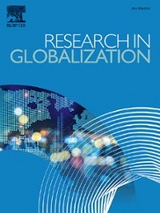
Urbanisation and rural development in sub-Saharan Africa: A review of pathways and impacts
Sakketa, Tekalign GutuExternal Publications (2023)
in: Research in Globalization 6, article 100133
DOI: https://doi.org/10.1016/j.resglo.2023.100133
Open access
This paper reviews the current state of literature on the impacts of urbanisation on rural development in the context of sub-Saharan Africa (SSA), with special emphasis to the pathways through which urbanisation affect rural economic development. Assessments of these effects diverge greatly. While some authors see urbanisation as strongly benefitting rural areas, for instance, through increased demand for agricultural goods and services, others highlight negative effects, for example, through the loss of livelihoods emanating from displacements and the conversion of agricultural land that may lead to urban sprawl. Given this complexity, a review that thoroughly analyses the causal relationships between urbanisation and rural development is warranted. To do this, the paper identifies seven pathways through which urbanisation affects rural development both positively and negatively: i) production and consumption linkages; ii) employment linkages; iii) financial linkages; iv) land market linkages; v) information and knowledge linkages; vi) social interactions linkages; and vii) environmental externalities linkages. The study suggests that recognising the importance of such linkages and incorporating them into the local and national economic policies is crucial for sustainable development. Overall, the review findings indicate that the impact of urbanisation on rural development in SSA is conditional and heterogeneous. It is conditional because countries need to be well-placed to reap the benefits of urbanisation, i.e., they need to have conducive infrastructure and institutional settings, as well as strong political commitment and leadership. When well-managed, however, urbanisation can play a pivotal role in reducing rural poverty, improving food security and creating opportunities for rural transformation. To this end, the review has identified research gaps that have important policy relevance in SSA. Addressing these gaps is imperative to harnessing the economic advantages of rapid urbanisation in a way that supports rural areas and promotes sustainable development.

